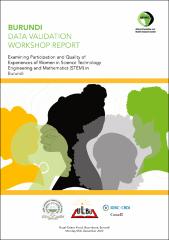Examining Participation and Quality of Experiences of Women in Science Technology Engineering and Mathematics (STEM): Postgraduate Training Programs and Careers in Burundi, Data Validation Report

Date
2024-11Author
Mwangi, Leah
Uwizeye, Dieudonne
Karimi, Florah
Vicente-Crespo, Marta
Gitau, Evelyn
Metadata
Show full item recordUsage Stats
0
views
views
0
downloads
downloads
Abstract
Africa remains the only region globally where women constitute a minority in postgraduate STEM training, despite worldwide commitments to gender justice. While women in Uganda have increasingly enrolled in higher education, the realities of gender equality have grown more complex and nuanced. Although women are well-represented in some fields like biological sciences, they remain significantly underrepresented in others, such as mathematics and engineering.
The persistence of gender inequality in Uganda’s higher education system is exacerbated by the interplay of pre-entry barriers faced by women transitioning from primary to higher education and entry barriers encountered when moving from graduate to postgraduate studies in various fields. This entrenched inequality limits women’s access to advanced jobs, positions, influence, and wealth, perpetuating a culture of disparity that affects their welfare and development in STEM.
To improve women’s participation in postgraduate STEM training and achieve gender equality in these disciplines in Uganda, it is essential to raise awareness about the importance of STEM education and increase opportunities for women and girls in these fields. Reforming policies related to supervision and mentorship to address historical, cultural, and traditional barriers to college admission could be a critical step in addressing gender inequality in Uganda’s higher education system.
